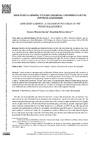Identificador persistente para citar o vincular este elemento:
https://accedacris.ulpgc.es/jspui/handle/10553/72899
| Campo DC | Valor | idioma |
|---|---|---|
| dc.contributor.author | Morales García, Carmen | en_US |
| dc.contributor.author | Rivero Suárez, Benedicta | en_US |
| dc.date.accessioned | 2020-06-02T19:24:22Z | - |
| dc.date.available | 2020-06-02T19:24:22Z | - |
| dc.date.issued | 2016 | en_US |
| dc.identifier.issn | 2386-6837 | en_US |
| dc.identifier.other | Dialnet | - |
| dc.identifier.uri | https://accedacris.ulpgc.es/handle/10553/72899 | - |
| dc.description.abstract | Resulta casi incompresible que Mercedes Gaibrois no haya sido reconocida aún, en nuestros días, como una de las más relevantes figuras femeninas de la historia de España y América del siglo XX. Podemos considerarla como una de las primeras mujeres historiadoras en España, una de las precursoras de la Historia de Género y sin duda, la primera mujer que entró como miembro correspondiente en la Real Academia de la Historia. Pese a su labor como historiadora de “mujeres” y moverse en un ambiente donde sus amigas mas íntimas encarnan el espíritu de la superación intelectual femenina de principios del siglo XX, Gaibrois buscará un alejamiento de polémicas y centrará sus objetivos en dos campos: como investigadora de reinas medievales y como difusora de un feminismo intelectual y católico a través de su labor periodística en la revista Voluntad. | en_US |
| dc.description.abstract | It turns out almost uncompressible that Mercedes Gaibrois has not been recognized still, nowadays, as one of the most relevant feminine figures of the history of Spain and America of the 20th century. We can consider it to be one of the first women historians in Spain, one of the precursors of the History of Kind and undoubtedly, the first woman who entered as corresponding member the Royal Academy of the History. In spite of his labor like historian of “women” and to move in an environment where his friends mas intimate personify the spirit of the intellectual feminine overcoming of beginning of the 20th century, Gaibrois will look for a withdrawal of polemics and will centre his aims on two fields: as investigator of medieval queens and as diffusive of an intellectual and catholic feminism across his journalistic labor in the magazine Voluntad. | en_US |
| dc.language | spa | en_US |
| dc.source | XXI Coloquio de Historia Canario-Americana [ISSN 2386-6837], v. XXI(052), p. 0599-0609 | en_US |
| dc.subject | 55 Historia | en_US |
| dc.subject.other | Historia Cultural | en_US |
| dc.subject.other | Historia de Canarias y América | en_US |
| dc.subject.other | Historia de las mujeres | en_US |
| dc.subject.other | Historiografía | en_US |
| dc.subject.other | Cultural History | en_US |
| dc.subject.other | History of Canaries and America | en_US |
| dc.subject.other | History of the women | en_US |
| dc.subject.other | Historiografía | en_US |
| dc.title | Mercedes Gaibrois: una historiadora colombiana en el Fondo Ballesteros | en_US |
| dc.title.alternative | Mercedes Gaibrois: A Colombian historian in the Fondo Ballesteros | en_US |
| dc.type | info:eu-repo/semantics/conferenceObject | en_US |
| dc.type | conferenceObject | en_US |
| dc.relation.conference | XXI Coloquio de Historia Canario-Americana | en_US |
| dc.identifier.url | http://dialnet.unirioja.es/servlet/articulo?codigo=7343387 | - |
| dc.description.lastpage | 0 | en_US |
| dc.description.firstpage | 52 | en_US |
| dc.investigacion | Artes y Humanidades | en_US |
| dc.type2 | Actas de congresos | en_US |
| dc.contributor.authordialnetid | No ID | - |
| dc.contributor.authordialnetid | 123055 | - |
| dc.identifier.dialnet | 7343387ARTLIB | - |
| dc.utils.revision | Sí | en_US |
| dc.identifier.ulpgc | Sí | en_US |
| dc.contributor.buulpgc | BU-HUM | en_US |
| item.fulltext | Con texto completo | - |
| item.grantfulltext | open | - |
| crisitem.event.eventsstartdate | 01-10-2014 | - |
| crisitem.event.eventsenddate | 31-10-2014 | - |
| crisitem.author.dept | GIR IATEXT: Patrimonio cultural: textos, materialidades y memorias | - |
| crisitem.author.dept | IU de Análisis y Aplicaciones Textuales | - |
| crisitem.author.parentorg | IU de Análisis y Aplicaciones Textuales | - |
| crisitem.author.fullName | Rivero Suárez,Benedicta | - |
| Colección: | Actas de congresos | |
Visitas
285
actualizado el 16-ene-2026
Descargas
184
actualizado el 16-ene-2026
Google ScholarTM
Verifica
Comparte
Exporta metadatos
Los elementos en ULPGC accedaCRIS están protegidos por derechos de autor con todos los derechos reservados, a menos que se indique lo contrario.
